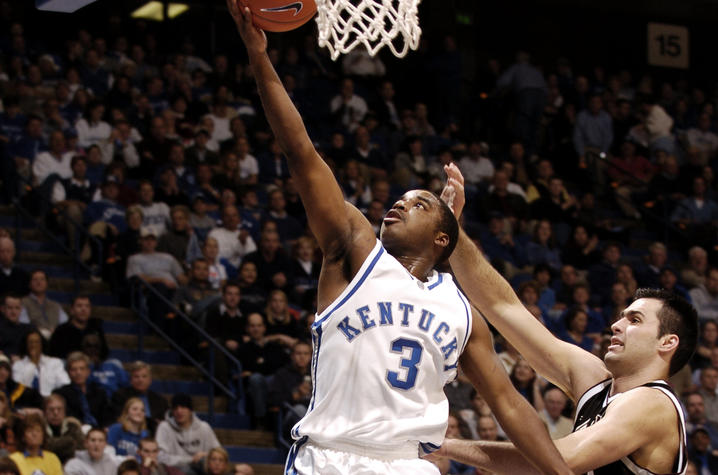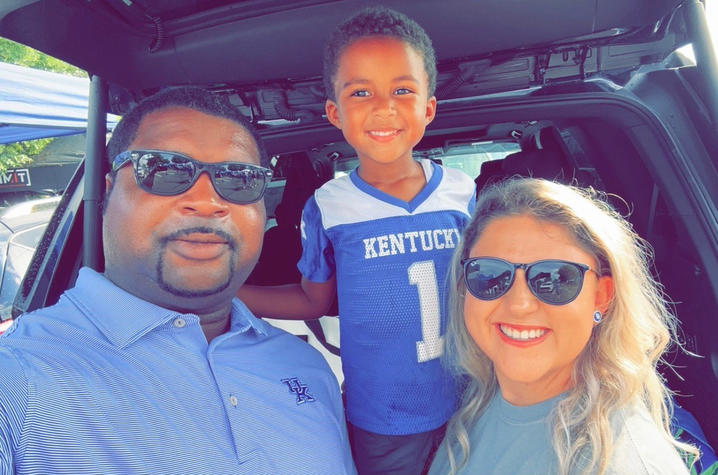Former Wildcat now a champion for prostate cancer screening
LEXINGTON, Ky. (Sept. 24, 2025) — Brandon Stockton says his most memorable moment as a University of Kentucky basketball player came after a crucial game-winning steal against Tennessee in 2006, when he shared a celebratory chest bump with Coach Tubby Smith that went viral. Two decades later, that same fighting spirit would help him face a different kind of opponent at the University of Kentucky Markey Cancer Center.
An unexpected diagnosis
At 40 years old, Stockton had no symptoms and felt completely healthy when routine blood work in January 2025 led to a prostate cancer diagnosis. The former Kentucky Mr. Basketball (2002) and four-year UK player under Coach Smith had every reason to think the labs would come back normal.
The discovery came through what Stockton calls “a godsend” from his wife.
“She couldn’t sleep the night before my lab appointment and said ‘something felt off,’” Stockton said. “She asked me if I could also get a PSA test, so I went ahead put in the request for that at the last minute.”
That last-minute addition to his lab work revealed elevated PSA levels that led to his cancer diagnosis. The results shocked Stockton, who now coaches high school basketball in his hometown of Glasgow.
“Everything I’ve ever heard was that 40 was too young to be coming up with that diagnosis,” said Stockton. “I had no family history of prostate cancer either. It was just kind of a rare thing.”
Coming full circle
When seeking providers for treatment following his diagnosis, Stockton felt drawn back to his alma mater.
He admits his strong connections to UK may have made him a bit biased, but the first meeting with his oncologist Patrick Hensley, M.D., at UK Markey Cancer Center confirmed it was the right choice.
“I just felt like we connected from the very first words,” Stockton said. “He made me feel so comfortable and confident in my treatment plan that I canceled all the other initial appointments I had scheduled with other providers. I already knew that he was the doctor I wanted to work with.”
“While uncommon, Brandon’s path to diagnosis at such an early age reflects he and his wife’s commitment to his health,” said Hensley. “When I first met them in clinic, I knew he was well supported from his family and community, which provided him confidence in seeking care and ultimately choosing an effective treatment strategy. I commend him for his enduring cancer fight, and his willingness to share his story with others to move young men towards cancer screening and preventative care.”
Stockton underwent a robotic radical prostatectomy in May 2025. Post-surgery pathology revealed stage 2 prostate cancer, but Dr. Hensley successfully removed all cancerous tissue.
Today, Stockton is cancer-free with undetectable PSA levels and continues monitoring with regular check-ups every three months.
A message worth sharing
Stockton now wants to use his platform and his story to spread awareness about prostate cancer screening – especially among Black men, who are at increased risk.
Black men are about twice as likely to be diagnosed with prostate cancer compared to white men, and they also tend to develop more aggressive forms of the disease. Because of this elevated risk, medical guidelines recommend that Black men have discussions with their health care providers about screening starting at age 40 – exactly Stockton’s age when he was diagnosed.
While routine screening isn’t recommended for average-risk men until age 55, Stockton’s case illustrates why high-risk individuals shouldn’t wait. His wife’s intuition to request the PSA test during routine blood work may have saved his life.
“Early screening saved my life, and I want to use that experience to help others,” Stockton said. “Being a former UK basketball player gives me a platform in Kentucky. I hope my story reaches men who are at higher risk or hesitant about getting screened.”
For men who have hesitation about getting screened, Stockton’s message is personal:
“You’ve got to look at your life and the people you would leave behind,” he said. “Life is precious, and if you’ve got chances to save it, you should take them.”
UK HealthCare is the hospitals and clinics of the University of Kentucky. But it is so much more. It is more than 10,000 dedicated health care professionals committed to providing advanced subspecialty care for the most critically injured and ill patients from the Commonwealth and beyond. It also is the home of the state’s only National Cancer Institute (NCI)-designated Comprehensive Cancer Center, a Level IV Neonatal Intensive Care Unit that cares for the tiniest and sickest newborns and the region’s only Level 1 trauma center.
As an academic research institution, we are continuously pursuing the next generation of cures, treatments, protocols and policies. Our discoveries have the potential to change what’s medically possible within our lifetimes. Our educators and thought leaders are transforming the health care landscape as our six health professions colleges teach the next generation of doctors, nurses, pharmacists and other health care professionals, spreading the highest standards of care. UK HealthCare is the power of advanced medicine committed to creating a healthier Kentucky, now and for generations to come.






